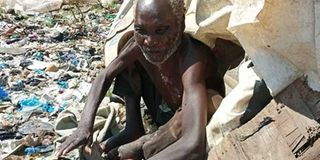Kachok dumpsite relocation leaves Kisumu's oldest street boy ‘homeless’

Isaac Caleb Hasava, 85, who says he has lived at Kisumu's Kachok dumpsite for the last 49 years. Its relocation now leaves him "homeless". PHOTO | JUSTUS OCHIENG | NATION MEDIA GROUP
What you need to know:
- He claims he had lived at the Kachok dumpsite for the last 49 years, living hand-in-glove with the wandering dogs.
- Former Governor Jack Ranguma, 63, often claimed the dumpsite was still in existence by the time he was born.
- Governor Anyang’ Nyong’o vowed to relocate it to Kajulu, a landfill in Kisumu East, some ten kilometres north-east of the town.
At 85, Isaac Caleb Hasava would probably be enjoying his sunset years, spending time telling his grandchildren about World War II or the Mau Mau struggles.
But he has no known grandchildren and for him there is no sunset here.
Every day, the Kisumu sun pummels his reclining hairline before the chill of the night serves up to freeze his soul, reminding him of his impoverished life.
He claims he had lived at the Kachok dumpsite for the last 49 years, living hand-in-glove with the wandering dogs.
When we met him on Wednesday, the bearded man emerged from his shanty made of polythene and cartons, looking frail but with a strong memory.
FROM VIHIGA
“I come from Majengo (in Vihiga County) but I have lived here almost my entire life. I see nothing wrong because this is Kenya,” he says in halting Kiswahili.
Kachok dumpsite is as old as Kenya itself.
Locals and officials cannot exactly put an age to it, but rather use estimates.
Former Governor Jack Ranguma, 63, often claimed the dumpsite was still in existence by the time he was born.
Today, it receives about 400 tons of garbage every day, according to a sanitation report by the Kisumu County government.
KACHOK MOVED
On Wednesday, Governor Anyang’ Nyong’o vowed to relocate it to Kajulu, a landfill in Kisumu East, some ten kilometres north-east of the town.
That project, which had seen various court cases stall it, will cost Sh97 million by the time it is completed in three months.
But the poor may still chase after the trash for survival.
Mr Hassava, according to the dumpsite manager John Ochieng’ Orinda, made it his home when he was just 36.
Today, he lives in a makeshift house of plastic bags on top of the trash which he calls home, right in the middle of Kachok dumpsite.
Maybe he has developed immunity over time, but he needs no toilet, no kitchen or bedroom. It all happens in one place.
Due to old age, he is slowly losing his eyesight and now relies on voices to recognise his visitors.
FOOD AND WATER
“Please I need food and water. Give me ugali,” he shouts as his colleagues lead journalists to his ‘house.’
His door is a about two feet high so he crawls out of his makeshift structure on a bare chest, trousers loosely hanging on his waist and continues to plead for food.
His favourite meal is bread although he accepts other soft foods like fried potatoes and boiled meat.
On other occasions, he scavenges through the fresh garbage brought here.
Mr Hasava prefers speaking while squatting or sitting but cannot explain why he lives at the dumpsite, only insisting he is a Kenyan, free to live in any part of the country.
AWARE OF RIGHTS
Somehow, he is still aware of his rights, as seen in the way he loses his cool when asked why he stays here and not elsewhere.
“I have a right to live where I choose to,” he says.
At Kachok, there are about 80 street boys, all younger than Hassava.
“These people you see here are my family. I stay with them here and I am not ready to move from this place because I am a Kenyan and this is Kenya,” Mr Hasava says.
APPEAL FOR HELP
Mr Orinda admits there is need for the county and national governments to consider helping the old man and his colleagues.
“At his age, he needs somebody to keenly monitor him. We can really appreciate if he can be taken to a rehabilitation centre so that he is closely monitored,” Mr Orinda says.
He adds: “We have more than 80 members of the street families who rely on this dumpsite.”
Last year, then Principal Secretary for Special Programmes Josephta Mukobe toured Kisumu where she announced a programme to rehabilitate street families.
“These families can be linked to existing government revolving funds to support them in running income generating activities,” she said.





